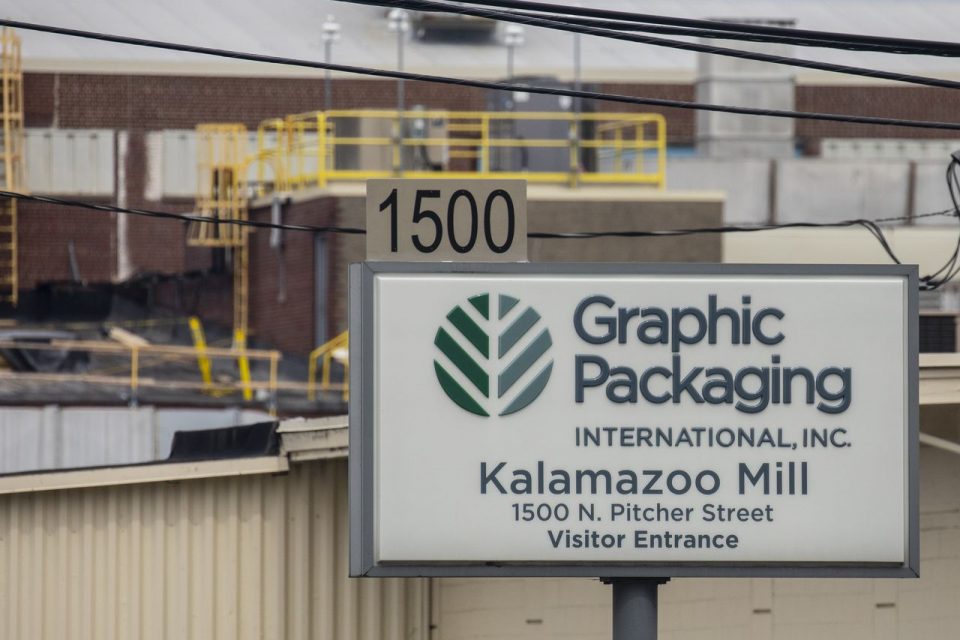KALAMAZOO, MI — A class action lawsuit filed against a packaging company by Kalamazoo residents upset with emissions from its recycled paperboard factory will move forward after a federal judge declined to dismiss the case.
On Monday, Jan. 31, U.S. District Court Judge Janet Neff denied a motion by Graphic Packaging International (GPI) to dismiss or stay the lawsuit, which was filed in September 2020 by Northside neighborhood residents.
Those residents claim the mill at 1500 N. Pitcher Street, which is nearing completion of a $600 million expansion, continues to release “noxious odors, air particulates, and fugitive dust onto Plaintiffs’ property, which cause property damage by nuisance and negligence.”
The emissions have allegedly burned their eyes, made them cough and forced them to stay indoors.
In March 2021, Graphic Packaging asked Judge Neff to either dismiss or pause the case indefinitely while the Michigan Department of Environment, Great Lakes and Energy (EGLE) investigated nuisance odor complaints and enforced violations of state environmental law.
Neff finally denied the request this week, writing that Graphic Packaging “fails to specify a single issue or determination by EGLE or any agency that would benefit or impact this case.”
“Therefore, Defendant has no ground to stand on in stating that an agency is more likely to resolve an issue correctly within the context of a statutory or regulatory scheme because Defendant has not even named what issue is properly within the expertise of an agency and not within the conventional experience of a judge,” Neff wrote.
Graphic Packaging declined to comment on the decision through a public relations firm.
Laura Sheets, an attorney for the Detroit firm Liddle Sheets Coulson, said Neff’s decision brings the case closer to discovery, a step in the litigation process where each side can seek documents and other evidence in support of their case from their opponent.
Neff must also yet certify the case as a class action.
“While our years-long investigation into the facility has garnered thousands of pages of publicly-available documents, getting over this procedural hurdle will allow us to get information directly from GPI,” Sheets said in an email. “We believe that this information will help us establish our claim that GPI is, in fact, the source of the noxious odors that have been blanketing and damaging this neighborhood for years.”
Brandi Crawford-Johnson, a former Northside Kalamazoo resident who is lead plaintiff in the case, said she was thankful Neff denied the dismissal motion.
“The judge kind of went off on (GPI), it seemed like,” said Crawford-Johnson, who said she moved away from Kalamazoo to escape the factory odors.
Crawford-Johnson has over the past several years pushed for heightened scrutiny on Graphic Packaging and accountability for regulators and government entities she believes have not acted forcefully enough to address a problem plaguing a predominantly Black community.
This month, Crawford-Johnson met with civil rights compliance officers at the U.S. Environmental Protection Agency (EPA), who are investigating whether EGLE discriminated on the basis of race when it approved an air pollution permit for the expanding factory in 2020.
Industrial odors have long plagued the area around the Kalamazoo factory, but they began drawing new scrutiny in 2020 when the city began deliberating a tax break to help Graphic Packaging expand its operations, which are located next to the city’s riverside wastewater treatment plant.
The Michigan Department of Health and Human Services (DHHS) says it plans to release a report this spring that outlines possible health consequences from exposure to hydrogen sulfide, an unregulated gas emitted by Graphic Packaging wastewater infrastructure that’s been found in the city’s Northside neighborhood in concentrations that experts say merit further investigation.
Graphic Packaging argues that its own investigations have concluded the Kalamazoo mill operations do not create a nuisance situation for neighboring residents.
In October, the Kalamazoo City Commission agreed to give the company a one-year tax abatement on the facility after the state rejected its decision in 2020 to approve a 12-year tax break that was contingent on reducing industrial odors.
The city and Graphic Packaging are developing a “community benefits agreement” this year as part of that approval.
Related stories:
Lawsuit claims factory is stinking out neighbors
EPA probes discrimination claim in pollution oversight
Odorous factory gets pollution permit approval
Asthma rates in Kalamazoo neighborhood prompt study
How to report foul industrial odors in Kalamazoo
Odor violations mount at Kalamazoo factory getting tax break
Why did it take so long for air concerns to get traction?
MLive documentary: Environmental justice in Michigan


